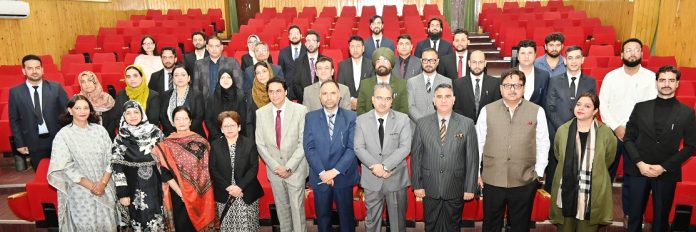SRINAGAR: Under the patronage of Justice ArunPalli, The Chief Justice, High Court of Jammu & Kashmir and Ladakh (Patron-in-Chief, J&K Judicial Academy), and under the guidance of Chairperson and Members of the Governing Committee of the J&K Judicial Academy, the Judicial Academy organized a One Day Workshop on the Arbitration & Conciliation Act, 1996 – Law, Practice and Procedure at its premises in Mominabad, Srinagar, for Judges of the District Judiciary of Kashmir Province and the Union Territory of Ladakh.
The programme commenced with the introductory remarks by Director, J&K Judicial Academy, Sonia Gupta, who outlined the objectives of the workshop and emphasized the increasing significance of arbitration as a preferred mechanism for resolving disputes.
The workshop was conducted by Advocate Manish Mehrotra who spoke on “Strengthening Arbitration and its Enforcement in India.”
In his introductory remarks, he emphasized that the “foundations of arbitration lies on less technicalities and more on substantial justice”.
Mehrotra provided an overview of the domestic arbitration ecosystem, highlighting current challenges such as high costs, delays, inconsistency in arbitral proceedings, and post-award enforcement delays. He emphasized that expeditious post-award enforceability is crucial and that courts must remain conscious of this aspect to ensure the efficiency of the arbitration system.
He further noted a significant gap in the quality and training of arbitrators in India, advocating for robust panels and routine training programs for arbitrators, lawyers handling arbitration disputes, and judicial officers, underscoring that capacity building must extend beyond the courts to the entire arbitration ecosystem.
Mehrotra also elaborated on the grounds for setting aside arbitral awards under Section 34. He also explained the role of courts in enforcing arbitral awards under Section 36 and the judicial approach to the contentious debate of “seat versus venue.” Drawing upon legislative amendments and judicial precedents, he stressed the need for consistency and efficiency in arbitral enforcement.
“Scope of Injunctive Relief under Section 9 of the Arbitration Act.” was also discussed.
Mehrotra examined the comparative dimensions of Section 9 (court’s power) and Section 17 (tribunal’s power) in granting interim reliefs. He discussed injunctions, asset protection, status quo orders, and the standards of “just and convenient” relief, while also highlighting the limits of judicial intervention.
He further addressed Section 29-A, dealing with courts’ power to extend arbitral timelines, underlining the balance between efficiency and fairness.
Key highlights of recent amendments and landmark judgments were also discussed, with participants encouraged to reflect on their practical implications in arbitration proceedings.
The workshop concluded with an interactive session and feedback, where participants engaged in discussions on challenges faced in arbitral enforcement and interim reliefs.
The programme was marked by active participation and thoughtful discussions, reinforcing the Academy’s commitment to equipping the judiciary with the necessary knowledge and skills to strengthen dispute resolution frameworks.


